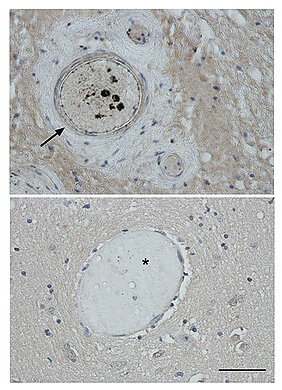Blood clots aggravate brain injuries
04/13/2016When the brain is injured in an accident, the damage continues to spread in the following days. Blood clots are obviously to blame for this as a research team of the University of Würzburg has found.

Causes include falls during sports accidents or vehicle accidents: Traumatic brain injury is the most common cause of death and permanent disability in teenagers and young adults. In survivors, the brain damages usually worsen directly after the accident. So far, there are no therapeutic options available to prevent this development.
A possible solution is described by Würzburg scientists under the leadership of Professors Anna-Leena Sirén (experimental neurosurgery) and Christoph Kleinschnitz (neurology) in the magazine "Annals of Neurology": According to the researchers, inhibition of blood coagulation factor XII might stop the brain damage from progressing further.
Tissue samples provided the decisive cue
How did the researchers come to this conclusion? "We investigated tissue samples of patients with traumatic brain injury provided by Uppsala University with which we cooperate in the European research association CnsAflame," Sirén explains. It turned out that blood clots in the patients' brains clog blood vessels with particular frequency.
The research team believed that this is the reason why the brain damage spreads. They studied the mechanism in mice whose blood does not coagulate because the factor XII is missing. "Clogged blood vessels and post-traumatic subsequent damage were reduced significantly here," biologist Dr. Christiane Albert-Weißenberger explains. Suppressing the blood coagulation using rHA-Infestin-4, a factor XII inhibitor from CSL Behring GmbH (Marburg), also had a protective effect.
What is more: "We did not observe any bleeding when using the inhibitor. This is crucial for the drug's safe application," explains pharmacist Sarah Hopp-Krämer, who wrote her doctoral thesis on this topic in the working group of Christoph Kleinschnitz. Bleeding is a frequent complication in traumatic brain injury. Therefore, therapeutic drugs must not under any circumstances trigger bleeding.
Still a long way to clinical application
The team's conclusion: The new findings are an important step towards developing new therapies for patients suffering from craniocerebral injuries. "The patients' tissue samples have provided valuable information in this regard," Kleinschnitz further. But he predicts that several more years will pass until accident victims can potentially benefit from the new knowledge, because further tests have to be conducted to study the long-term effect of the inhibitor rHA-Infestin-4, among others. The scientists hope to continue their long-standing collaboration with the Marburg-based company for this purpose.
Sponsors of the research project
The research project was financed by the EU-funded CnsAflame research association through the Else-Kröner-Fresenius Foundation, CSL Behring GmbH and the University of Würzburg's Interdisciplinary Center for Clinical Research.
“Targeting Coagulation Factor XII as a Novel Therapeutic Option in Brain Trauma“, Sarah Hopp, Christiane Albert-Weissenberger, Stine Mencl, Michael Bieber, Michael K. Schuhmann, Christian Stetter, Bernhard Nieswandt, Peter M. Schmidt, Camelia-Maria Monoranu, Irina Alafuzoff, Niklas Marklund, Marc W. Nolte, Anna-Leena Sirén, and Christoph Kleinschnitz, Annals of Neurology, DOI: 10.1002/ana.24655
Contact
Prof. Dr. Anna-Leena Sirén, Department of Neurology of the Würzburg University Hospital, Phone +49 931 201-24579, siren.a@nch.uni-wuerzburg.de
Prof. Dr. Christoph Kleinschnitz, Department of Neurology of the Würzburg University Hospital, Phone: +49 931 201-23755, christoph.kleinschnitz@uni-wuerzburg.de






